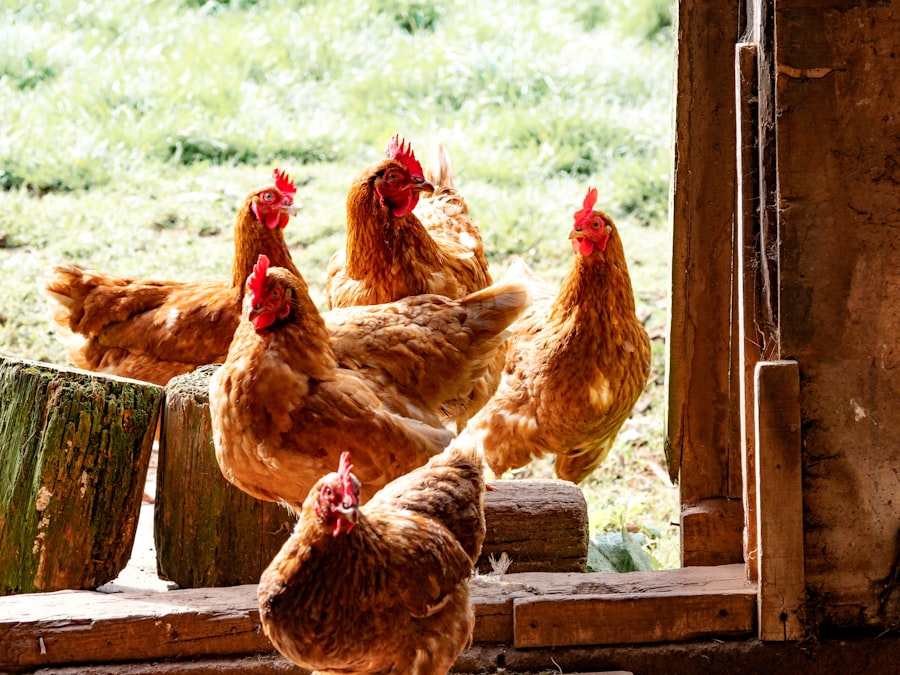Keeping guinea fowl and chickens together is a practice that has gained popularity among backyard poultry enthusiasts. These two species can coexist harmoniously and provide several benefits to each other. However, there are also challenges that come with keeping them together. In this article, we will explore the characteristics and behavior of guinea fowl and chickens, the benefits of keeping them together, factors to consider before introducing guinea fowl to a chicken flock, how to prepare the chicken coop for guinea fowl, feeding them together, managing their behavior, and potential challenges that may arise.
Key Takeaways
- Guinea fowl and chickens can be kept together in the same coop and run.
- Guinea fowl are great foragers and can help control pests in the garden.
- Before keeping guinea fowl and chickens together, consider their different needs and behaviors.
- Modifications to the chicken coop may be necessary to accommodate guinea fowl.
- Managing guinea fowl and chickens together requires careful observation and attention to their interactions.
Understanding Guinea Fowl and Chickens
Guinea fowl and chickens are both domesticated birds but have distinct characteristics and behaviors. Chickens are known for their docile nature and are often kept for their eggs and meat. They are social animals that thrive in groups and have a well-defined pecking order. Chickens are also good foragers and will scratch the ground in search of insects, seeds, and other food sources.
On the other hand, guinea fowl are known for their loud calls and alert nature. They are excellent at pest control as they eat a wide variety of insects, including ticks, grasshoppers, and even small snakes. Guinea fowl are also known for their ability to sound an alarm when they sense danger, making them excellent watchdogs for your flock.
Benefits of Keeping Guinea Fowl and Chickens Together
One of the main benefits of keeping guinea fowl and chickens together is pest control. Guinea fowl have a voracious appetite for insects, making them excellent natural pest control agents. They will roam around the yard or pasture, eating ticks, fleas, flies, and other pests that can bother your chickens. This can help reduce the need for chemical pesticides and keep your flock healthier.
Another benefit is companionship. Guinea fowl and chickens can form bonds and provide social interaction for each other. They will often forage together and roost in the same area, creating a sense of security and companionship. This can be especially beneficial for chickens that may become stressed or bored when kept alone.
Personal experiences and anecdotes can illustrate these benefits. For example, one poultry enthusiast shared how her guinea fowl helped control a tick infestation in her backyard, resulting in healthier chickens and a reduced risk of tick-borne diseases. Another person mentioned how their guinea fowl acted as an early warning system, alerting the chickens to potential predators and keeping them safe.
Factors to Consider Before Keeping Guinea Fowl and Chickens Together
Before introducing guinea fowl to a chicken flock, there are several factors to consider. First, you need to assess the space available. Guinea fowl are more active and require more space than chickens. They like to roam and fly, so having a large yard or pasture is ideal. If your space is limited, it may not be suitable for keeping guinea fowl.
Temperament is another important factor to consider. Guinea fowl can be more aggressive than chickens, especially during breeding season or when they feel threatened. It’s important to observe your chicken flock’s behavior and assess whether they can handle the presence of guinea fowl without becoming stressed or injured.
To assess whether your chickens are ready for guinea fowl, you can start by introducing them to other poultry species, such as ducks or geese. If they coexist peacefully, it may be a good indication that they will also tolerate guinea fowl. However, if your chickens show signs of aggression or stress towards other species, it may not be advisable to introduce guinea fowl.
Preparing the Chicken Coop for Guinea Fowl
To prepare the chicken coop for guinea fowl, you need to make some adjustments to accommodate their specific needs. First, ensure that the coop has enough space for both species to move around comfortably. Guinea fowl like to perch at night, so providing enough roosting space is essential.
Nesting boxes should also be modified to accommodate guinea fowl. Guinea fowl prefer to lay their eggs on the ground rather than in elevated nesting boxes like chickens. You can create a separate area with straw or hay where guinea fowl can lay their eggs.
Creating a safe and comfortable environment is crucial for both species. Make sure the coop is secure and predator-proof, as guinea fowl are more susceptible to predation than chickens. Provide adequate ventilation and bedding material to keep the coop clean and dry.
Chicken Coop Modifications for Guinea Fowl

In addition to preparing the coop, you may need to make some modifications to accommodate guinea fowl. Guinea fowl prefer higher perches than chickens, so adding higher roosting bars or platforms can provide them with a comfortable resting place.
Guinea fowl also like to fly and perch on trees or other elevated structures. Adding ramps or branches inside the coop can give them opportunities for exercise and perching. Make sure these modifications are sturdy and secure to prevent injuries.
Feeding Guinea Fowl and Chickens Together
When it comes to feeding guinea fowl and chickens together, it’s important to provide a balanced diet for both species. Guinea fowl have higher protein requirements than chickens, so offering a higher protein feed or supplement can help meet their nutritional needs.
Both species can eat a variety of grains, seeds, fruits, and vegetables. However, guinea fowl have a preference for insects and greens. Providing access to pasture or allowing them to free-range can help satisfy their natural foraging instincts.
It’s important to monitor their feeding behavior and ensure that all birds have access to food. Guinea fowl can be more aggressive at feeding time, so providing multiple feeding stations or spreading the food out can help prevent conflicts.
Managing Guinea Fowl and Chickens Together
Managing guinea fowl and chickens together requires monitoring their behavior and health. It’s important to observe any signs of aggression or stress and intervene if necessary. Separating individuals that are being bullied or injured can help maintain a peaceful coexistence.
Regular health checks are also important to ensure the well-being of both species. Guinea fowl are more susceptible to certain diseases, such as blackhead, so monitoring their overall health and seeking veterinary care when needed is crucial.
To prevent conflicts between guinea fowl and chickens, it’s important to provide enough space and resources for both species. This includes providing multiple feeding stations, water sources, and roosting areas. Ensuring that each bird has enough personal space can help reduce competition and aggression.
Potential Challenges of Keeping Guinea Fowl and Chickens Together
While there are many benefits to keeping guinea fowl and chickens together, there are also potential challenges that may arise. One challenge is the noise level. Guinea fowl are known for their loud calls, which can be disruptive to neighbors or people who prefer a quieter environment. It’s important to consider the noise regulations in your area before keeping guinea fowl.
Another challenge is aggression. Guinea fowl can be more aggressive than chickens, especially during breeding season or when they feel threatened. This can lead to injuries or stress among the flock. It’s important to monitor their behavior and intervene if necessary to prevent any harm.
Conclusion and Final Thoughts
In conclusion, keeping guinea fowl and chickens together can provide several benefits, such as pest control and companionship. However, it’s important to consider the characteristics and behavior of both species before introducing them. Assessing factors such as space and temperament is crucial to ensure a harmonious coexistence.
Preparing the chicken coop for guinea fowl and making necessary modifications can help create a safe and comfortable environment for both species. Feeding them together requires providing a balanced diet and monitoring their feeding behavior. Managing their behavior and health is important to prevent conflicts and ensure their well-being.
While there may be challenges in keeping guinea fowl and chickens together, with proper planning and management, it can be a rewarding experience. The benefits of pest control, companionship, and the unique characteristics of each species make it worth considering for backyard poultry enthusiasts.
If you’re considering keeping guinea fowl with chickens, it’s important to understand the dynamics between these two bird species. While they can coexist, there are certain factors to consider. One crucial aspect is providing adequate space for both types of birds. To learn more about how big a coop needs to be for chickens, check out this informative article on Poultry Wizard: How Big Does a Coop Need to Be for a Chicken? Additionally, if you’re looking for chicken coop run plans or considering an A-frame chicken coop design, Poultry Wizard has got you covered with these helpful resources: Chicken Coop Run Plans and A-Frame Chicken Coop.
FAQs
What are guinea fowl?
Guinea fowl are a type of domesticated bird that are commonly kept for their meat, eggs, and pest control abilities. They are native to Africa but have been introduced to other parts of the world.
Can guinea fowl be kept with chickens?
Yes, guinea fowl can be kept with chickens. However, it is important to introduce them slowly and monitor their interactions to ensure that they get along. Guinea fowl can be more aggressive than chickens and may bully them if they feel threatened.
What are the benefits of keeping guinea fowl with chickens?
Keeping guinea fowl with chickens can provide several benefits. Guinea fowl are excellent at controlling pests such as ticks, fleas, and grasshoppers. They are also good at alerting the flock to potential danger, such as predators.
What are the potential drawbacks of keeping guinea fowl with chickens?
One potential drawback of keeping guinea fowl with chickens is that they can be noisy. Guinea fowl are known for their loud calls, which can be disruptive to neighbors. Additionally, guinea fowl may be more prone to disease than chickens, so it is important to keep their living area clean and well-maintained.
How should guinea fowl be introduced to a flock of chickens?
Guinea fowl should be introduced to a flock of chickens slowly and carefully. It is best to keep them separated at first and gradually introduce them over a period of several weeks. This will give the birds time to get used to each other and establish a pecking order. It is also important to provide plenty of space and resources, such as food and water, to prevent competition and aggression.
Meet Walter, the feathered-friend fanatic of Florida! Nestled in the sunshine state, Walter struts through life with his feathered companions, clucking his way to happiness. With a coop that’s fancier than a five-star hotel, he’s the Don Juan of the chicken world. When he’s not teaching his hens to do the cha-cha, you’ll find him in a heated debate with his prized rooster, Sir Clucks-a-Lot. Walter’s poultry passion is no yolk; he’s the sunny-side-up guy you never knew you needed in your flock of friends!







